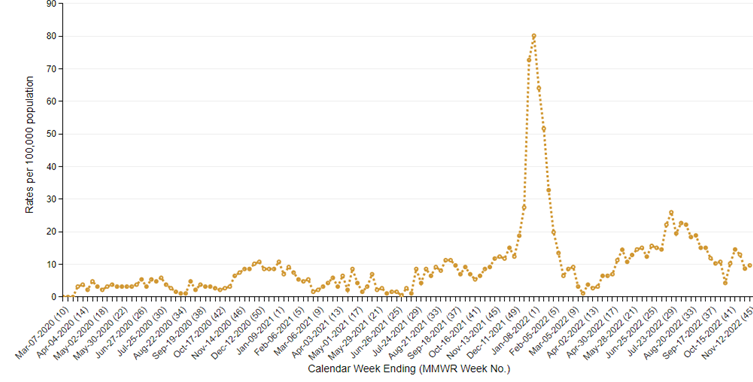Pregnant women vaccinated against COVID-19 can transfer their immunity to their unborn children and perhaps enhance the ability of infants 6 months and younger to ward off infection, according to new data from the Centers for Disease Control and Prevention (CDC).
The study shows that infants younger than 6 months had the same rate of hospitalizations as did seniors 65 to 74 during the omicron wave that swept through the U.S. over the summer. And, while hospitalizations increased for infants, the authors were quick to add that severe illness among infants did not increase.
The study, published in the CDC’s Morbidity and Mortality Weekly Report, concluded that “pregnant women should stay up to date with COVID-19 vaccination to help protect themselves and infants too young to be vaccinated.” The immune benefits of being vaccinated can be filtered through the placenta, and that might protect infants 6 months or younger, an age group for which a vaccine has yet to be developed.

Convincing pregnant women of the benefits of COVID-19 vaccinations has been something of a challenge for the CDC throughout the pandemic.
A CDC study in July looked at vaccination rates for women 18 to 49 years old and found that vaccination rates to be lowest among pregnant women at 45.1%, followed by women trying to get pregnant (49.5%) and women who were breastfeeding (51.5%). In addition, pregnant or breastfeeding non-Hispanic Black women had significantly lower rates of vaccination (aPR: 0.74 and 0.66, respectively) than non-Hispanic White women. The CDC says that 63.2% of all women aged 18 to 49 have gotten at least one dose of the COVID-19 vaccine.
The CDC’s findings come on the heels of a recent report by the Governmental Accountability Office (GAO) that found pregnancy-related deaths soared by 80% since 2018, a development fueled mostly by the pandemic. GAO researchers said “pregnant women with COVID-19 are more likely to experience pregnancy complications, severe illness, or death.”
One of the factors that possibly contributed to the growing rate of infants 6 months and younger being hospitalized might be growing immunity among other age groups, whether from vaccine or prior infection, the CDC study found.
It says that “multiple factors likely contributed to high COVID-19–associated hospitalization rates among young infants during the Omicron variant–predominant period, including the high infectivity and community transmission of the SARS-CoV-2 Omicron variant and the relatively low threshold for hospitalizing infants for signs and symptoms consistent with COVID-19 (e.g., fever) relative to that in older children.”
The omicron dominant period ran from Dec. 19, 2021, to Aug. 31, 2022; the delta dominant period ran from June 20 to Dec. 18, 2021, according to the CDC.
As omicron and especially its subvariants have proven over the last year, being vaccinated isn’t always a guarantee against infection. The CDC study found that “surveillance data show that compared with earlier periods, during the recent Omicron variant–predominant periods, a larger proportion of pregnant women received a vaccination series before pregnancy. Because of immune evasion when novel variants have emerged and waning immunity as time since the last dose increases, infants born during the Omicron BA.5 variant–predominant period might have had less protection.”
Nonetheless, COVID-19 vaccination is still the best way to avoid infection, and, more importantly, avoid hospitalization or death if infection occurs, according to the CDC.